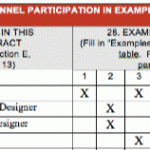
At some point, you’ll be assigned a task you simply don’t know how to do. Maybe it will be something you’ve never done before. Maybe you won’t even know where to begin.
And that can be frustrating, even scary. But luckily, there are steps you can take that will help you knock it out of the park.
In fact, I’m going to give you the exact scripts to use the next time you get one of these tasks.
Nobody Wants To Hold Your Hand
When we receive a task we feel we can’t do, the natural inclination is to tell the task giver we can’t do it.
But pushing back is the absolute worst thing you can do. So, you’ve got to fight that inclination.
If someone gives you a task, they either:
1. Know you can do it.
2. Expect you to figure out how to do it.
Nine times out of ten, the task giver does not want to hold your hand and work through it together with you. They are looking to delegate it so they can focus on higher level tasks.
So, what do you do?
The New Task Scripts
There are three things you need to do when faced with a seemingly impossible task.
1. Acknowledge the task
2. Research the task
3. Provide your approach
Acknowledge The Task
The first thing you need to do is confirm you know what’s being asked of you.
Here’s what you need to say:
”Here’s what I heard. You want me to [describe the task, deliverable, and deadline]. Is that correct?”
At this point, the task giver will either confirm your understanding or correct you. Either way, it’s a win for you.
Now you have a clear understanding of what’s being asked of you. But you probably still don’t have the foggiest idea of how to do it.
That’s OK. The next step is research.
But before you start researching, you’ve got to get out of that person’s office.
Here’s what to say:
”Since this is new to me, I’m going to look at this and come back with some thoughts on how I’ll approach it. When would be a good time to come back?”
Saying this accomplishes a few things. First, you’re indicating that although this task is new to you, you’re going to give it a go. Second, it sets expectations for the next step. Lastly, you acknowledge the task givers’ time considerations.
Research The Task
Try to complete this next step within 20 minutes. What we’re going to do is research and jot down notes about how you’ll approach the task.
Once you get back to your seat, you’ve got two resources available to you.
1. Whatever was provided to you
2. Google
There will be at least a few instances where the task giver provides you with all the information you need to come up with an approach. Do not fail to thoroughly review all documents you have been provided. If your approach does not take into account the directions provided to you, you’ll end up looking bad.
The rest of the time, Google is your friend.
For example, let’s say someone gives you an Excel spreadsheet and says, ”Turn this into a pivot table.” For someone who has never opened Microsoft Excel, that’s going to seem like an impossible task. Luckily for you, directions for most tasks are just a Google search away.
For example, you could search “Excel pivot table tutorial” or “how to create pivot table in Microsoft Excel” in Google. In those search results, you’ll find step-by-step instructions and videos showing you how to create your pivot table.
Even if the task giver asks you to “perform brain surgery,” there are Google results that will help you piece together your approach.
Provide Your Approach
On a piece of paper, jot down the steps of how you’ll approach it. What we’re looking for is how you will do it and why you will do it that way. Keep it under a page.
At the designated time, take your notes to the task giver and use this script:
“I went through what you gave me and did a little research. Here’s how I plan to approach this task.”
Then recite what you wrote down. It’s Ok to use notes. This is not a speech contest.
Once you are done, ask, “Is that how you would approach it?”
The task giver will either be super impressed by your thoughtfulness and go-getter attitude…or realize they made a horrible mistake. If it’s clear, after hearing your approach, that the task is beyond your skill set…you’ve just made a commendable effort. And you can hold your head up high.
If they agree with your approach, you now know exactly how to complete the task. There is no more guesswork. So, just go do it.
Considerations
Here are a few extra considerations for completing these tasks.
Triple Check Your Work
One of the biggest annoyances when giving out a task is when the person you trusted doesn’t take the time to double-check their work. The last thing anyone wants is a work product riddled with errors.
Don’t just double check your work…triple check it. Spend the appropriate amount of time checking the quality of your work.
Finishing a task and immediately handing it over is a rookie mistake. Triple check your work.
Use The Scripts In Person
I don’t care how busy the task giver is. These scripts should be used in person or over the phone.
You should only use these via email if you are working remote and all phone lines are down.
Now Its Your Turn
What were some of the most challenging tasks assigned to you? Share with us in the comments.





I’ve been providing marketing and proposal services on a contract basis since being laid off, and your posts are a great resource! Thanks Matt! This is great guidance!